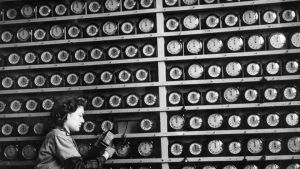Sarah Zhang in The Atlantic:

In the year 2514, some future scientist will arrive at the University of Edinburgh (assuming the university still exists), open a wooden box (assuming the box has not been lost), and break apart a set of glass vials in order to grow the 500-year-old dried bacteria inside. This all assumes the entire experiment has not been forgotten, the instructions have not been garbled, and science—or some version of it—still exists in 2514.
By then, the scientists who dreamed up this 500-year experiment—Charles Cockell at the University of Edinburgh and his German and U.S. collaborators—will be long dead. They’ll never know the answers to the questions that intrigued them back in 2014, about the longevity of bacteria. Cockell had once forgotten about a dried petri dish of Chroococcidiopsis for 10 years, only to find the cells were still viable. Scientists have revived bacteria from 118-year-old cans of meat and, more controversially, from amber and salt crystals millions of years old.
All this suggests, according to Ralf Möller, a microbiologist at the German Aerospace Center and collaborator on the experiment, that “life on our planet is not limited by human standards.” Understanding what that means requires work that goes well beyond the human life span.
More here.
